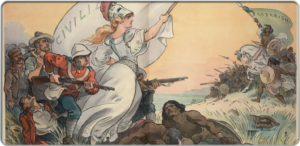Decolonising the Scottish Museum: The Stakes of a Decolonial Approach to Scottish History
Museums Galleries Scotland have commissioned a set of three blogs from Professor Tommy J. Curry. Tommy is a Professor in Philosophy at the University of Edinburgh. These blogs follow on from Tommy’s lecture series in June 2022. The blogs will assess the challenges before museum educators, curators, and theorists in their quest to decolonise the museum.
Decolonisation is emerging as a transformational perspective across throughout various institutions and higher education sectors in Scotland. The recent endorsement of the Edinburgh Slavery and Colonialism Review has not only acknowledged that the historical role Scotland has played in the slave trade but recognized that the legacy of racialist thinking “endowing some, overwhelmingly White, families with enormous wealth while condemning other, overwhelmingly Black, families to poverty” remains an enduring feature of Scottish society.[i]
What is Decolonisation?
Often debates over the need, purpose, and ends of decolonisation are erroneously represented to the Scottish public as a political agenda introduced by Black radicals rather than an intellectual paradigm aimed at producing a material history and documenting sociologically verifiable inequities and disparities between racial groups throughout a particular society.[ii] Decolonisation, as a process of inquiry examining the material history and archival record to ascertain how imperial practices of enslavement, genocide, and colonialism have organised societies, is perhaps the most effective paradigm for the de-universalisation of Western knowledge.
Dr. Claire Wintle has accurately observed that “Decolonisation is, of course, a contested term.”[iii] Within European intellectual circles, predominately white institutions have come to understand decolonisation as a term that is “inclusive of formal acts of withdrawal from the colonies, [as well as] the impact of anticolonial struggles and neocolonial models of ‘freedom,’ pointing as well to the social processes of reimagining and practicing European, American, and colonial lives after empire.”[iv] However, contemporary academic interpretations present decolonisation as a program of inclusion that aims to reform and expand the existing structures of Western democratic societies. This understanding of decolonisation, while popular among numerous U.K. higher education institutions, is at odds with the definition and practices of decolonialisation among Black intellectuals and oppressed peoples throughout the Global South.
The late Dr. Robert Staples, one of the founders of Black Studies in the United States, argued that “decolonization is the process by which the oppressed group begins to determine its own destiny and run its own affairs…A genuine decolonization effort requires breaking the psychological, cultural, political and economic shackles of the old order.[v] Similarly Frantz Fanon, the creator of decolonial theory, explained in The Wretched of the Earth that “Colonialism is not satisfied with snaring the people in its net or of draining the colonized brain of any form or substance. With a kind of perverted logic, it turns its attention to the past of the colonized people and distorts it, disfigures it, and destroys it.”[vi] Oppressed peoples have understood decolonisation as a process of freeing their minds and consciousness from the mythologies of white history that has been built on the insidious logic of racial inferiority.
Unlike popular academic theories of decolonisation taking root in U.K. universities suggesting that decolonisation primarily concerns itself with the inclusion of Black and other non-white groups into empire, Black theorists emphasize the urgency of rejecting mythologies of white racial superiority that created the wealth and political power of European societies. As Ngugi explains, imperialism is a cultural bomb that aims to “annihilate a people’s belief in their names, in their languages, in their environment, in their heritage of struggle, in their unity, in their capacities and ultimately in themselves…[vii] Despite its proclamations of tolerance and democracy, Scotland is a nation that benefitted from the enslavement of African peoples where non-whites are still managed, educated, and socially organised based on the presumption of white superiority. Race and racism remain relatively unexplored and unacknowledged forces of social organisation within Scottish society.

Decolonising Scottish Museums
Decolonial research exposes the contingency of what is taken to be history, a universally accepted record of the past that is often Eurocentric and incomplete. To say history is Eurocentric is not a term of derision, but rather a description of how what is presumed to be a well-accepted objective truth in a particular Western society is the product of institutions and individuals aiming to manufacture consent for projects of conquest and the violence produced by multiple theaters of war. Throughout multiple European societies, museums became institutions cementing imperial conquest to the blood and soil of nations. Dr. John M. McKenzie explains that “Museums were an expression of the western conviction in the onward march of the rational,” over the savagery of the darker world.[viii] These institutions exemplified racial hierarchies and allowed the white citizens of Great Britain to “glean information about diverse peoples’ cultures and climates, make assumptions about their relative positions in socio-evolutionary hierarchies, and justify their own political and economic subjugation of such peoples.”[ix] Museums were observatories of racial hierarchies where non-white populations from around the world were displayed as the devolved remnants of nature overlooked by civilisation.
Decolonisation unveils the blood-stained relics of Scottish empire. It examines the exsanguination of the Black, Brown, and Indigenous bodies used to nourish the insatiable appetite of imperial conquest and colonial endeavor. To truly benefit from the knowledge produced by emerging decolonial research projects and perspectives, Scottish museums must reconcile the structural and cultural prominence of whiteness with the harm produced by its racist historical projects. To realise a truly democratic society the myths of racial superiority must be identified and eradicated from the collective consciousness of its citizens and the relics chosen to represent the nation.

[i] Edinburgh Slavery and Colonialism Legacy Review: Report and Recommendations (Edinburgh: City of Edinburgh Council, 2022), 10.
[ii] Mike Wade, “University of Edinburgh’s Slavery Row Response Shameful,” The Times, January 17, 2022.
[iii] Claire Wintle, “Decolonizing the Smithsonian: Museums as Microcosms of Political Encounter,” American Historical Review 121.5 (2016):1495.
[iv] Claire Wintle, “Decolonizing the Smithsonian: Museums as Microcosms of Political Encounter,” 1495.
[v] Robert Staples, “Race and Colonialism,” The Black Scholar 7.9 (1976): 41.
[vi] Frantz Fanon, The Wretched of the Earth (New York: Grove Press, 2004), 149.
[vii] Wa Thiong Ngugi, The Decolonized Mind: The Politics of Language in African Literature (Narobi: East African Educational Publishers, 1986), 3.
[viii] John M. McKenzie, Museums and Empire: Natural History, Human Cultures, and Colonial Identities (Manchester: Manchester University Press, 2009), 1.
[ix] Claire Wintle, “Visiting the Empire at the Provincial Museum 1900-50,” in Curating Empire: Museums and the British Imperial Experience, eds. Sarah Longair & John McAleer (Manchester: Manchester University Press, 2014), 37.